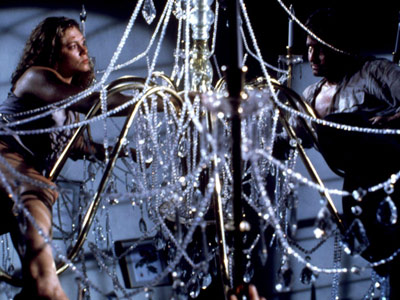War Of The Roses
This ultra-black comedy from 1989 certainly shows off the directorial skills of Danny DeVito: The shot composition and camera angles are spot on, and DeVito shows some real style in having the story play out. However, throughout the movie, the biggest problem is the one-sided dynamic the screenplay displays in depicting the warring couple played by Michael Douglas and Kathleen Turner. There is no way any reasonable viewer could watch this and NOT say that Turner’s Barbara Rose is clearly the bad guy here: After twenty years of marriage and two kids together, her reasons for wanting a divorce are blatantly selfish, and while Douglas’s Oliver Rose may be an egotistical prick at times, he still comes across as a fairly good husband who doesn’t cheat, doesn’t abuse her, and allows her to start her own business with barely any resistance so that she can feel financially independent after supporting her for so many years, even though the film tries hard to say that BOTH of them are equally repellent. If the audience is given a reason to despise both equally, then the story would come off as more balanced and acceptable. DeVito though, does smartly reserve the character who is the heart of the story for himself: His Gavin D’Amato tells the story via wraparound flashback to a potential client wanting a divorce (Dan “Homer Simpson” Castellaneta), and thru his telling we see Gavin turn from a wanton ladies man to someone who comes to understand that the bonds of marriage is something to be taken seriously, and not to be frittered away for frivolous reasons (even if the credibility of things is in question since he talks about a number of incidents between the Roses that he was not even present to witness). As for the rest of the cast, Marianne Sagebrecht is annoying as hell as the stereotypical overweight housekeeper constantly speaking in broken English, contributing little importance to the overall story. The Roses’ two kids (with the son played by Sean Astin), are little more than mere ciphers, having little to no say or even opinions of the ongoing conflict between their mom and dad. DeVito starts the film at a fast clip, then slows things down some as we witness Barbara decide after twenty years that she wants a divorce because she “doesn’t love him anymore”. However, the third act deserves mention for its full barrel no-holds-barred mayhem, as Oliver finally takes the offensive and the two of them literally destroy their dream house trying to be rid of each other. Once again though, while Oliver resorts to some outlandish tactics (including hilariously peeing on a fish), I still got the sense that in the end all he really wanted was to preserve his family in the name of home and hearth, while Barbara continues to use every dirty trick that her female mind can come up with (including going so far as trying to seduce her husband’s best friend). It’s also annoying the way we’re told early on that Turner’s character was a “former gymnast”, thus giving us an excuse for her (or her double) to do various acrobatic tricks as tensions escalate. Regardless, major props to DeVito for giving us a downbeat, rather depressing ending that keeps in perfectly with the overall dark nature of the film. In the end, a skillful directing and acting job from DeVito that could have benefitted from a more balanced screenplay…
7/10
